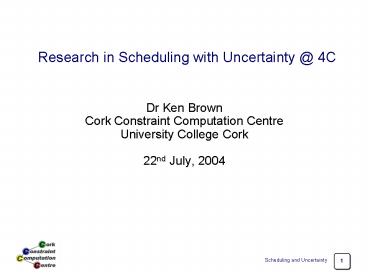Research in Scheduling with Uncertainty 4C - PowerPoint PPT Presentation
1 / 19
Title:
Research in Scheduling with Uncertainty 4C
Description:
welding tasks and weld tests have expected durations ... welds fail, and must be repeated, delaying other welders. each (weld, welder) pair has expected failure rate ... – PowerPoint PPT presentation
Number of Views:22
Avg rating:3.0/5.0
Title: Research in Scheduling with Uncertainty 4C
1
Research in Scheduling with Uncertainty _at_ 4C
- Dr Ken Brown
- Cork Constraint Computation Centre
- University College Cork
- 22nd July, 2004
2
Whats in the talk?
- resource allocation in the presence of change and
uncertainty - an overview of some real problems from the North
Sea Oil and Gas sector - an introduction to research being undertaken at
4C - a request for application problems!
3
Resource Allocation ...
goods schedules solutions
orders tasks problems
4
... is often dynamic and uncertain
The world is an uncertain and dynamic place
equipment fails
weather conditions change
new orders arrive
employees become ill
suppliers fail to meet deadlines
Often, we have some partial knowledge of the
changes
5
Oil pipelines
- pipelines connect oil platforms with onshore
facilities - pipelines are assembled onshore, then towed out
to sea and laid in a trench - each pipe is a bundled set of smaller pipes
6
Pipeline assembly scheduling
- teams of welders, with skill levels, assemble the
bundles - welding tasks and weld tests have expected
durations - aim is to schedule the workforce to meet the
deadline
Aim schedule the welders to meet the deadline,
while minimising expected paid downtime
7
Platform maintenance
- Each unmanned gas platform has many components
and subsystems - Each part has a recurring maintenance window
- Teams of engineers flown out daily by helicopter
- Maintenance staff must be supported by a stand-by
vessel within a given radius of the platform - Aim is to schedule a years worth of tasks,
minimising costs
8
Dynamic platform maintenance
- BUT
- components fail or platforms go down, and must be
repaired immediately - weather conditions shrink the safety radius, or
even stop the helicopters flying
Aim construct a maintenance schedule robust to
the likely changes
9
Container loading
- containers must be laid on deck
- layout must obey safety constraints
- aim is to select the optimal set of containers
and their optimal layout
10
Dynamic container loading
- BUT
- containers arrive at the quayside at uncertain
times - the list of containers is not known with certainty
Aim lay out the initial containers giving
flexibility to finish the layout profitably
11
The implications
- When the world changes after a schedule is
generated - the schedule is no longer correct
- new tasks have appeared (and old ones
disappeared) - constraints on existing tasks have changed
- resources are no longer available
- potential profits and penalties have changed
- Can we generate a new schedule quickly?
- Can we generate a new schedule with minimal
changes? - Can we generate an initial schedule that is
robust, so that we have fewer changes to make?
12
The implications for constraint computation
- When a problem changes after a solution is
generated - the constraints are no longer correct
- new variables exist (and old ones have
disappeared) - domains change
- optimisation criteria change
- and so
- previous solution is incomplete
- previous assignments of values to variables are
invalid - previous search processes are invalid
- What changes to we need to make to the CP
solution and CP solving process?
13
Basic constraint approaches
- React
- Re-specify the problem and re-solve
- Local search to find new similar solutions
- Prepare to react
- Re-solve by adapting stored reasoning process
- Predict
- generate initial solutions that are robust
- generate initial solutions with contingencies
14
OUCH!
- Online Uncertain Constraint Handling
- 4C project studying solution methods for problems
which grow as new tasks arrive continuously - Three main approaches
- control systems
- stochastic sampling
- probabilistic reasoning
15
OUCH! Control Systems
- Start with a fast online solver, which reacts to
each new task using a flexibility heuristic - Monitor the performance of the heuristic and
control the importance of flexibility with
respect to current profit - Monitor the distribution of new tasks, and
control the parameters of the flexibility
heuristic to better model the distribution
16
OUCH! Sampling
- assumes a probability distribution on the likely
changes - at each step, sample possible futures using the
distribution - compute the most profitable immediate decisions
based on the sample - maximising expected profit
- minimising regret
- achieving consensus
17
OUCH! Probabilistic Reasoning
- assumes a probability distribution on the likely
changes - at each step, calculate the theoretically optimal
decision through constraint-based extensions to
decision theory - calculating optimal decisions will take too long?
- developing "anytime" algorithms, to produce a
series of increasingly optimal decisions
18
Application problems?
- OUCH! is funded by Enterprise Ireland, providing
two PhD students to develop methods. - Part of our remit is to investigate real
application problems faced by Irish industry - Typical examples might include
- manufacturing scheduling
- workforce rostering
- vehicle routing
19
Request for problems
- Do you have dynamic resource allocation problems?
- Can you describe those problems to us?
- we can provide reports on likely solution
techniques. - we may be able to provide demonstrator solutions.
- we don't need funding!
Contact Ken Brown (k.brown_at_cs.ucc.ie) James
Little (j.little_at_4c.ucc.ie)































